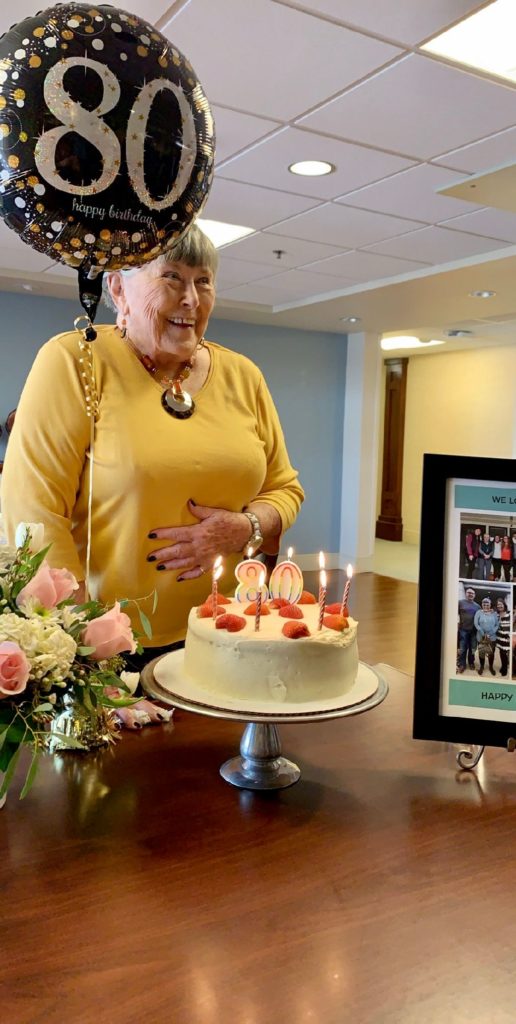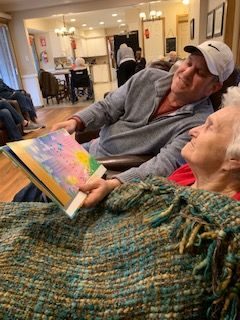
As a resident in a small memory care home in Wichita, 83-year-old Patricia “Pat” Shibley could count on daily visits from one or more of her four children. That ended March 16, when the coronavirus pandemic caused it to be closed to virtually all visitors.
“Family will not be allowed in unless this is a medical emergency,” Shibley’s daughter-in-law, Timirie Shibley, said the next day. “We’re not sure she really grasps the magnitude of it. Patrick (Pat’s son and Timirie’s husband) said she doesn’t want to think about.”
Timirie Shibley worried the lockdown on her mother-in-law’s memory care home will adversely affect her already precarious health.
“Patrick’s pretty convinced that all the visits and support and love she’ s getting has kept her going. Now (there are) no visitors, not even the lady coming and doing their nails.”
Thousands of area residents experienced similar upheavals because of the coronavirus threat. In fact, with schools, businesses and other organizations shutting down and unprecedented restrictions put in place by the government, it’s difficult to find anyone who wasn’t impacted. The fact that elderly people are particularly susceptible to the virus made it that much more disruptive to them.
“I think the fear of the unknown is what’s really impacting,” said Rozanna O’Brien, executive director Aging Projects, Inc., a nonprofit which provides hot meals to seniors across south central Kansas. “And with them being more vulnerable and likely targets, it’s hard for them to understand all this. And it came on so fast.”
API normally serves hot lunches at 23 sites in Sedgwick, Butler and Harvey counties, feeding about 1,100 people per day. That was scheduled to change March 23, when API planned to begin offering only meals for people to pick up and take home. The menus, which are published each month in the active age, will stay the same.
“We’ll also be giving people some shelf-stable meals just to make sure they have something if they’re uncomfortable leaving the home,” O’Brien said.
‘People are petrified’
API will try to offer home delivery of meals to all those who need it, O’Brien said.
“We have people who are just petrified to come out of their house. We have people who say we don’t want volunteers to come to their house.”
In the latter case, API is suggesting people leave a cooler on their porch where hot meals can be left or opt for shelf-stable meals.
“We’re going to do whatever we need to do to make them comfortable,” O’Brien said. “They just have to feel safe. They also have to have good food.”
API has received requests from new people to participate in the program, which receives funding through the Older Americans Act, since the coronavirus threat worsened. If people want information on the program, she asked them to contact their local meal sites or to call API at 316-681-4440.
“At this point, we’ve got it handled with our current volunteer base,” O’Brien said. “But we always need volunteers.”
A more pressing challenge was finding hand sanitizers. “We can’t even get it ordered right now. Our delivery people are putting gloves on, which is much more expensive. So if anybody out there knows of any…”
O’Brien said coronavirus’ impact on the meal program far exceeds any previous emergency, including the 911 terrorist attacks, and she could only hope things would return to normal by early April.
“We will be keeping close watch. We may be able to open up in a Haysville or Harvey County or Butler if there’s very little (coronavirus) activity and things have calmed down, whereas in Sedgwick County we couldn’t. It’ll be based on wherever the epicenter is.”
Most area senior centers either closed or were expected to. Senior Services, Inc., which operates four centers in Wichita, shut down all of them. Like other area centers, it usually offers a plethora of activities from group exercise and pickleball to classes on computers and crafts, Bible study, bridge and blood pressure checks. Executive director Laurel Alkire said it would continue to operate the Meals on Wheels program and possibly its senior employment program. “We’re going to try to figure how to do things over the phone.”
The Meals on Wheels program typically delivers hot meals to about 875 people Monday through Friday and will continue to do so “as long as I’ve got volunteers coming in to deliver.”
However, many volunteers are themselves elderly and worried about being exposed to the virus.
Alkire said meal recipients will also start getting shelf-stable meals “that they can stockpile.”
“We want them to have at least a week’s worth of meals.”
‘Let’s hope it doesn’t last’
Senior Services has gotten requests from new people to receive meals, while others are concerned about having any outside contact. “We’ve had some families call and say … they’re going to take their loved one off (the program) for a couple months. I hope they’re feeding them.”
The nonprofit also continues to offer its “roving pantry” grocery shopping service for homebound elderly. Alkire said she had not noticed an uptick in requests for that service.
One bright spot has been people stepping forward to help, Alkire said. The owner of Bungalow 26, a boutique located nearby, “called me and said what can we do to help you guys out” after temporarily closing her store because of the crisis. “I said we’ve got thousands of shelf-stable meals to put together.”
Going forward, Alkire said, “Our priorities are going to be nutrition and information assistance.”
“Let’s hope it doesn’t last until August,” she added.
Annette Graham heads up both the Sedgwick County Department on Aging and the Central Plains Area Agency on Aging, which covers Sedgwick, Butler and Harvey counties. Graham said her staff would try to continue to offer as many services as possible while figuring out “how can we change our service model to reduce risk to customers we serve and the staff.”
Generally, that will probably be by doing things over the telephone rather than in person.
Some outside providers that contract with the county to provide senior-related services “are saying they’re closing their doors for a few weeks, in an abundance of caution,” Graham said, while others such as in-home care providers for the elderly are continuing to operate.
Graham acknowledged that the “social distancing” that health officials recommend to stem the spread of coronavirus could lead to seniors feeling cut off from the communities.
“Certainly, social isolation comes with its own risk,” she said.
“It’s just like we have to take this one day at a time and realize that, like everything else, this too shall pass. But we all have to work together. For the good of each other, a lot of precautionary actions have to be taken.”
Caution signs
Working seniors everywhere found their routines interrupted, too, whether being required to work from home or behind closed doors. That’s where Priscilla Templin, executive director of the Augusta Historical Museum, found herself.
“If somebody needs something, I’ll take care of them, but as far as folks coming in and out, no,” Templin said. “It would be almost impossible to clean the artifacts. I wouldn’t even know where to start.”
Templin was one of thousands involved in events that got cancelled – in her case, a Wreaths Across America fundraiser that was a joint effort of the American Legion, VFW and local DAR chapter.
“We had to cancel our ham and beans meal at the senior center on Saturday because we just didn’t want to bring out the elderly residents,” she said. “I think everybody’s just erring on the side of caution.”
The Shibleys had a second parent in lockdown – Timirie’s mother, Karen VanDam, who’s 80 and resides in assisted living at the Kansas Masonic Home. They were last able to see her on March 15, when they took her out to dinner.
Shibley noted that her mother drives her own car and is usually otherwise active. But for now, the two can only communicate by telephone. Inside the home, the KMH staff delivered meals to residents’ rooms rather than have them eat together, although get-togethers for bingo, bridge and dominoes were still being allowed.
The Shibleys, who own Wichita’s popular Doo-Dah Diner, were also concerned about their “favorite customer,” an 88-year-old man who lives alone.
“He’s keeping himself home. He quit his bridge center, he just learned today that we were closed” except for take-out meals they’ve been selling at the Doo-Dah Market, located next door the restaurant. “Those are his two main social activities.”
Shibley had been getting ready to deliver a batch of chicken and noodles to the man when he unexpectedly showed up to pick it up himself.
Not knowing when things will return to normal is one of the worst parts of the situation.
“I wish I could say it was a 21-day lockdown and then we could go on with life,” Shibley said. “Everyone’s trying to get used to a new normal.”









